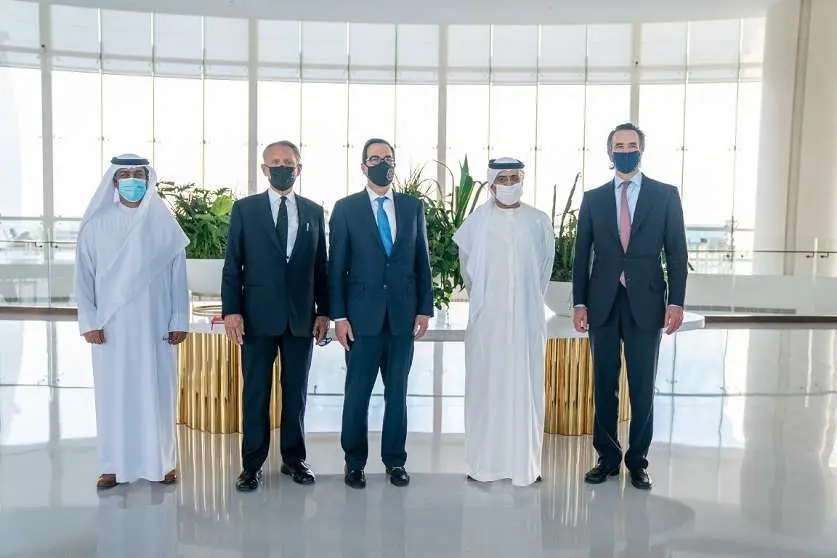The United States and the Emirates strengthen their bilateral relations

The US Secretary of the Treasury, Steve Mnuchin, met the Emirate Minister of State for Financial Affairs, Obaid Humaid al-Tayer, in Abu Dhabi on Saturday.
The meeting was also attended by the under-secretary of the Ministry of Financial Affairs, Younis Haji al-Khoori, and representatives of the Central Bank of the United Arab Emirates (UAE) to discuss strategic relations and financial and economic cooperation between the Arab country and the United States.
Mr Al-Tayer expressed the UAE's strong commitment to strengthening dialogue with the United States, as it is one of the country's most important strategic partners. "The Ministry of Financial Affairs is interested in strengthening bilateral relations between both countries in all areas of common interest, especially in the economic, financial and investment sectors," he told the US delegation.
The Emirates is the United States' largest non-oil trading partner in the region and the leading destination for US exports of goods and services to the Middle East. The American country is also the UAE's third largest trading partner in the world, as well as the third largest foreign investor in the Gulf country's markets.
The trip is part of the latest international tour of the US treasury secretary, who will soon have to hand over the baton to the former president of the Federal Reserve, the Democrat Janet Yellen. Israel, Egypt, Qatar and Sudan have also been part of the tour. His presence in Kuwait and Saudi Arabia was expected. However, the tension triggered by the assault on the Capitol led Mnuchin to cancel his visit to Kuwait and shorten that of Saudi Arabia, although he is expected to meet the Crown Prince Mohammed Bin Salman.
The visit takes place as the Trump Administration seeks to consolidate the Abraham Agreements which normalised the diplomatic relations of the Emirates and Bahrain with Israel.
It also comes shortly after the reconciliation between Qatar and its neighbours at the Gulf Cooperation Council (GCC) summit held on the 5th last, which was attended by the chief White House adviser, Jared Kushner.
This is the second visit made by Mnuchin in recent months, as he last paid it in October this year shortly after the Abraham Agreements. On that occasion it was a joint US-Israeli delegation that met Finance Minister Al-Tayer and Industry and Technology Minister Sultan bin Ahmed al-Jaber, as well as Emirati business leaders.
Emirati and Israeli businessmen discussed ways of strengthening trade and investment relations. They signed memoranda of understanding between companies from both countries and discussed the role of the agreements signed in September in opening up new horizons for co-operation in the region, thereby unlocking new economic opportunities.
The Secretary of State, Mike Pompeo, also visited Abu Dhabi in November last year to discuss progress in the normalisation of relations between Israel and the United Arab Emirates.
During the visit to Pompeii on 23 November other issues of mutual interest were also addressed in connection with security and combating Iran's influence in the region.
"During the Trump Administration, the relationship between the United States and the United Arab Emirates has become deeper and broader than at any other time," Pompeo said in a statement.
The United States recently sold weapons, including F-35 and MQ-9 drones, to the Emirates. A sale that caused discontent among many US senators, also Republicans, such as Chris Murphy and Rand Paul, who warned of the possibility of the UAE using the weapons to violate international law. This criticism is similar to that launched by Amnesty International, which fears they will be used in the Yemen War, in which the UAE is participating under the Saudi-led alliance.
In any event, relations between the two countries have grown closer, particularly during the Trump Administration. Bilateral trade exceeded $24 billion in 2019. The UAE invested $26.7 billion in the United States in 2018.
In security matters, the UAE has been part of the coalition against Daesh and cooperates with the United States in combating money laundering and the financing of terrorism.
Another example of this cooperation is the accession of the Arab Emirates to the Artemis Agreements, a coalition of six countries aimed at extending human activities to the moon and Mars.








